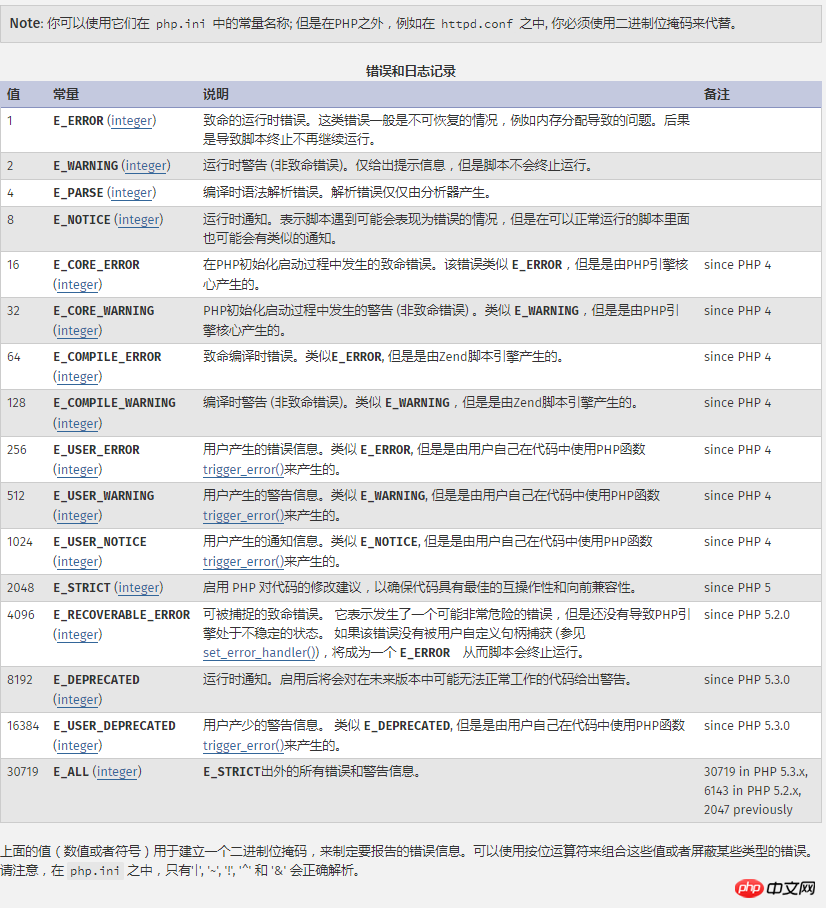Maison >développement back-end >tutoriel php >Paramétrage du niveau d'erreur PHP et analyse des principes
Paramétrage du niveau d'erreur PHP et analyse des principes
- 不言original
- 2018-05-04 10:02:541610parcourir
Cet article présente principalement le paramètre de niveau d'erreur PHP et l'analyse du principe. Il a une certaine valeur de référence. Maintenant, je le partage avec tout le monde. Les amis dans le besoin peuvent s'y référer
Introduction au principe
Dans le fichier de configuration PHP, php.ini a la configuration suivante :
; Error Level Constants: ; E_ALL - All errors and warnings (includes E_STRICT as of PHP 5.4.0) ; E_ERROR - fatal run-time errors; E_RECOVERABLE_ERROR - almost fatal run-time errors ; E_WARNING - run-time warnings (non-fatal errors) ; E_PARSE - compile-time parse errors ; E_NOTICE - run-time notices (these are warnings which often result ; from a bug in your code, but it's possible that it was ; intentional (e.g., using an uninitialized variable and ; relying on the fact it is automatically initialized to an ; empty string); E_STRICT - run-time notices, enable to have PHP suggest changes ; to your code which will ensure the best interoperability ; and forward compatibility of your code ; E_CORE_ERROR - fatal errors that occur during PHP's initial startup ; E_CORE_WARNING - warnings (non-fatal errors) that occur during PHP's ; initial startup; E_COMPILE_ERROR - fatal compile-time errors ; E_COMPILE_WARNING - compile-time warnings (non-fatal errors) ; E_USER_ERROR - user-generated error message ; E_USER_WARNING - user-generated warning message ; E_USER_NOTICE - user-generated notice message ; E_DEPRECATED - warn about code that will not work in future versions ; of PHP ; E_USER_DEPRECATED - user-generated deprecation warnings; ; Common Values: ; E_ALL (Show all errors, warnings and notices including coding standards.) ; E_ALL & ~E_NOTICE (Show all errors, except for notices) ; E_ALL & ~E_NOTICE & ~E_STRICT (Show all errors, except for notices and coding standards warnings.) ; E_COMPILE_ERROR|E_RECOVERABLE_ERROR|E_ERROR|E_CORE_ERROR (Show only errors) ; Default Value: E_ALL & ~E_NOTICE & ~E_STRICT & ~E_DEPRECATED ; Development Value: E_ALL ; Production Value: E_ALL & ~E_DEPRECATED & ~E_STRICT; http://php.net/error-reportingerror_reporting = E_ALL
Dans la configuration ci-dessus : error_reporting sert à définir le niveau de configuration par défaut E_ALL, ce qui signifie ; afficher toutes les informations d'avis, d'avertissement et d'erreur (Afficher toutes les erreurs, avertissements et avis, y compris les normes de codage.).
C'est expliqué en détail dans le manuel PHP Constantes prédéfinies, ce qui suit fait partie de l'extrait : 
Exemple : E_ALL & ~E_NOTICE
E_TOUS : 111011111111111
E_NOTICE : 1000
~E_NOTICE : 0111
E_ALL & ~E_NOTICE : 111011111110111
C'est ainsi que php contrôle le niveau d'erreur via la conversion binaire.
Ajustez le niveau d'erreur
Paramètres globaux
Modifiez le rapport d'erreur dans le fichier php.ini pour obtenir l'effet.
Par exemple :
1. error_reporting = E_ALL #输出所有错误,警告,notice信息 2. error_reporting = E_ALL & ~E_NOTICE #输出所有错误和警告信息,不输出notice信息 3. E_ALL & ~E_NOTICE & ~E_WARNING #输出所有错误信息,不输出警告,notice信息
Paramètres locaux
Dans un script ou un programme, l'effet peut être obtenu via les paramètres ini_set() et error_reporting().
Par exemple :
ini_set("display_errors",1)
error_reporting(E_ALL)相关推荐:
<a href="http://www.php.cn/php-weizijiaocheng-392917.html" target="_self">PHP报错并自动跳转</a>
Gestion des erreurs PHP en mode développement et en mode produit
Ce qui précède est le contenu détaillé de. pour plus d'informations, suivez d'autres articles connexes sur le site Web de PHP en chinois!
Articles Liés
Voir plus- Comment utiliser cURL pour implémenter les requêtes Get et Post en PHP
- Comment utiliser cURL pour implémenter les requêtes Get et Post en PHP
- Comment utiliser cURL pour implémenter les requêtes Get et Post en PHP
- Comment utiliser cURL pour implémenter les requêtes Get et Post en PHP
- Tous les symboles d'expression dans les expressions régulières (résumé)

